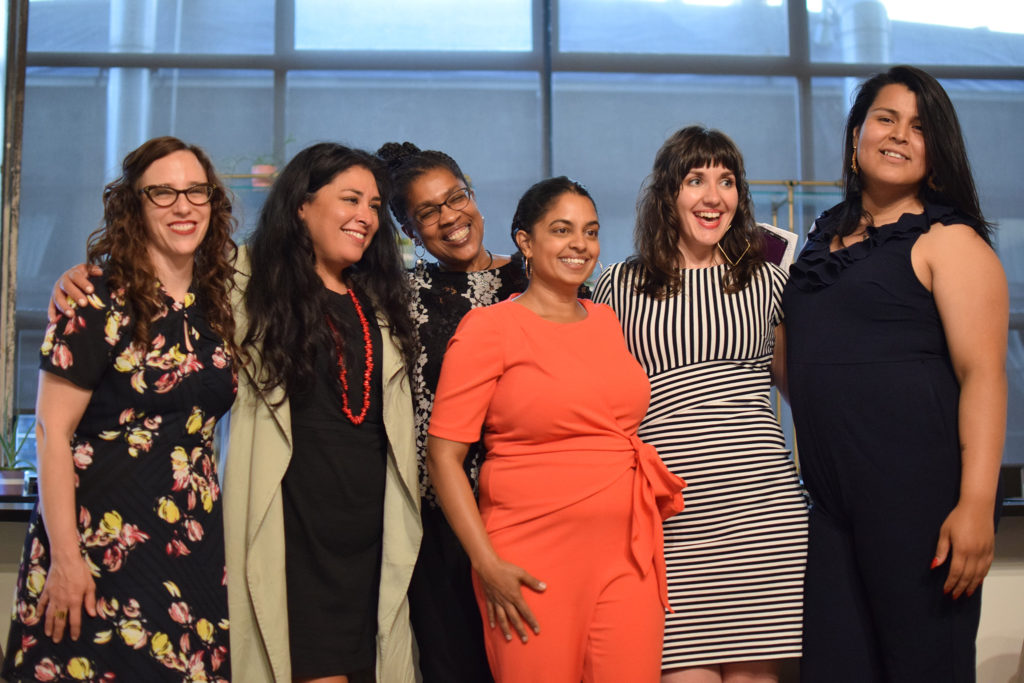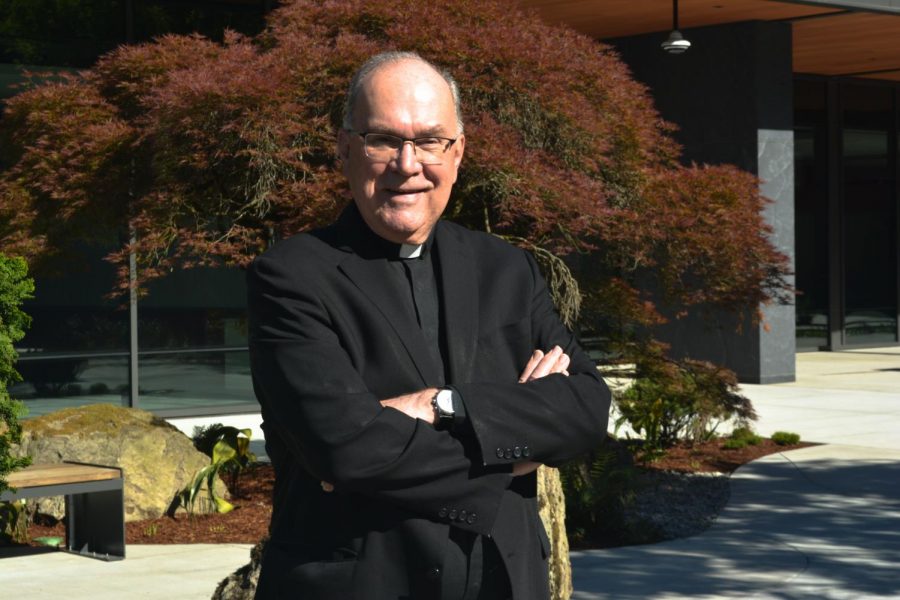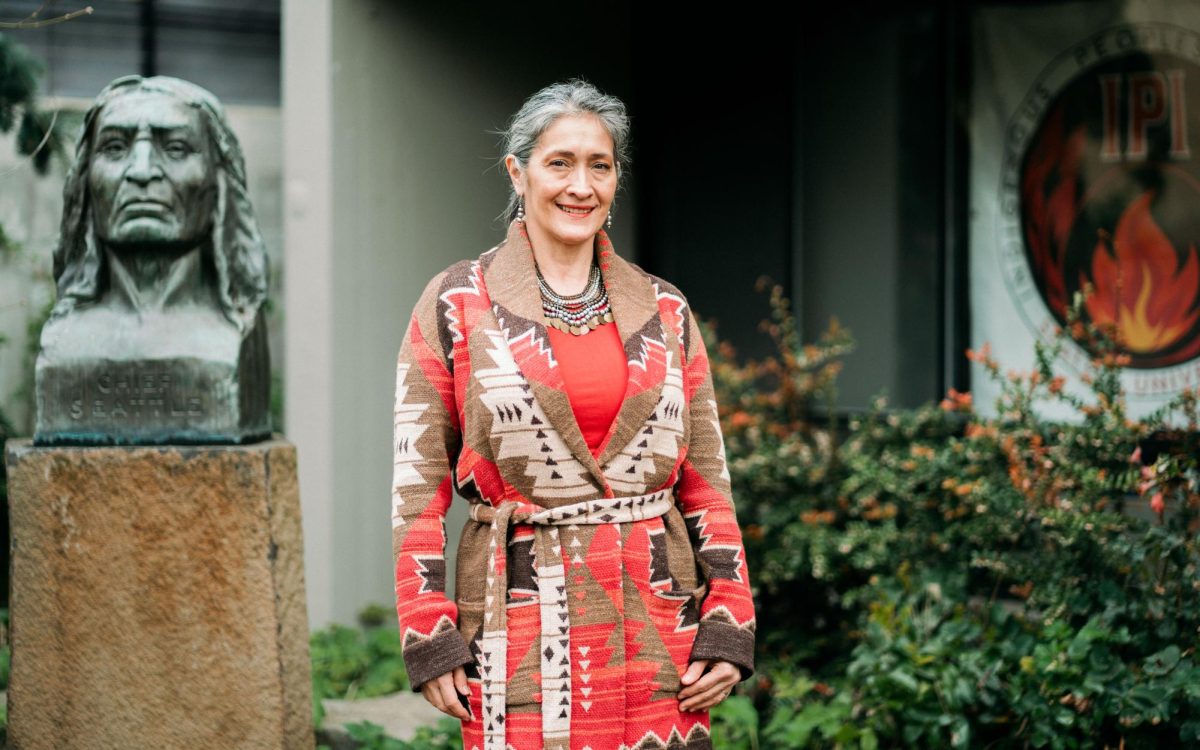The sun set as six women panelists’ voices rose over the attending crowd at The Riveter, Capitol Hill’s female- owned and managed coworking space. Driven by anger, courage and love, these women take intersectional approaches to their advocacy work throughout the Seattle community.
The panel, “Walk this Way: Womxn to Watch Right Now,” centered around the interconnectivity of movements fighting for LGBTQ+ rights, immigrants’ rights, gender and racial justice, environment protection, progressive philanthrophy, and equity and inclusion.
West Coast Director of OutRight Action International Katie Hulquist, a Seattle University alumna, hosted the event because she saw the interactions among various communities within the greater city of Seattle and wanted to feature the voices of powerful women within those groups.

Panelists Jessica Stern, Colleen Echohawk, Michele Storms, Sudha Nandagopal, Katie Carter, and Monserrat Padilla (from left) spoke at The Riveter on Thursday night.
“I wanted people to feel outrage at what our communities are facing and how our rights are being threatened and I wanted them to feel hopeful about the amazing work that his being done in our community on a variety of issues and how they can get involved,” Hultquist said.
Featured panelists included Executive Director of OutRight Action International Jessica Stern, Executive Director of ACLU of Washington, Michele Storms, CEO of the Pride Foundation Katie Carter, CEO of Social Venture Partners International Sudha Nandagopal, Coordinator of the Washington Immigrant Solidarity Network Monserrat Padilla, and Executive Director of Chief Seattle Club Colleen Echohawk (Pawnee/Athabascan).
Prominent female voices present at the event went beyond the panel. Nasty Woman Wines, founded by Meg Murray, and That Brown Girl Cooks!, a culinary brand forged by Kristi Brown, provided the drinks and tasty bites offered to attendees.
“I don’t care who you think you are, or who gave you the power, whether it’s Congress or the President, because I’m still coming after you and enough is enough.”
Keynote speaker, Representative Pramila Jayapal spoke to her own experience in positions of power and the importance of intersectionality in women in leadership.
“Intersectionality matters, how does it matter? Because I’m not a woman on Monday, an immigrant on Tuesday, a mom on Wednesday, and a worker on Thursday—I’m all of those things all of the time,” Jayapal said. “And for all of us, that means we fight for all of those things all of the time.”
The Riveter’s Senior Director for Diversity, Equity & Inclusion Jodi-Ann Burey, who moderated the panel, began by explaining that spelling “womxn” with an ‘x’ acknowledges trans women and women of color who have been historically excluded from conversations on the female experience.
To kick off the discussion, Echohawk shared her experiences as a Pawnee woman and her motivations in fighting for Native rights in Seattle. In Seattle, Native peoples make up 10% of the homeless population and are disproportionately more vulnerable to homelessness.
“What brought me to this work and continues to sustain me is, frankly, anger,” Echohawk said. “Love and anger push me forward.”
The other panelists agreed and shared their own motivations rooted in anger, love and courage. Padilla, an undocumented trans woman and coordinator of the Washington Solidarity Network, makes calls to Immigration and Customs Enforcement office directors on behalf of other undocumented immigrants with an unafraid, unashamed confidence.
“I don’t care who you think you are, or who gave you the power, whether it’s Congress or the President, because I’m still coming after you and enough is enough,” Padilla said.
Carter, Storms and Stern also shared their views and approaches to women in leadership.
“I think it’s about being unapologetic sometimes in being like ‘I can say blank, I’m going to wear lipstick, my heels are going to be high, it’s going to be great,” Carter said. “Sometimes it’s about modeling a different kind of leadership than we’ve gotten to see in the world.”
Storms reflected upon stereotypes and how women internalize these oppressive ideas and insecurities. She credits this knowledge as her motivator to overcome challenges and excel.
“I’m not a woman on Monday, an immigrant on Tuesday, a mom on Wednesday, and a worker on Thursday—I’m all of those things all of the time.”
“One of the things that’s been helpful to me about knowing that is that I can go, ‘Oh right. That’s bullshit,’” Storms said.
Stern shared her frustration in the fact that in 2017, OutRight Action International documented more mass arrests of LGBTQ+ people than in any other year on record. She expressed the need for thorough laws and policies that would actually protect people’s abilities to live safely, inclusively and without discrimination.
Nandagopal concluded that in starting with the most marginalized folks, solutions oftentimes do not look intersectional at first. However, she asserts that the solution will have intersectional results.
“It’s going to have an intersectional solution in the long run because you started with the folks who the table does not historically get set for,” Nandagopal said.
Burey encouraged attendees to go home and research the people and works referenced by the panelists. She believes that in addition to listening to the powerful changemakers in the panel, women need to be moved to do work of their own.
“The audience needs to have a sense of responsibility—these are incredible women and also regular women who are changing so many peoples’ lives, and people in the audience are also incredible people who can change each other’s lives,” Burey said.
“They are the ones shining a beacon of hope for me and I think everyone in Seattle needs to know them,” Hultquist said, speaking of the six powerful Seattle women.
Elise may be reached at
[email protected]











